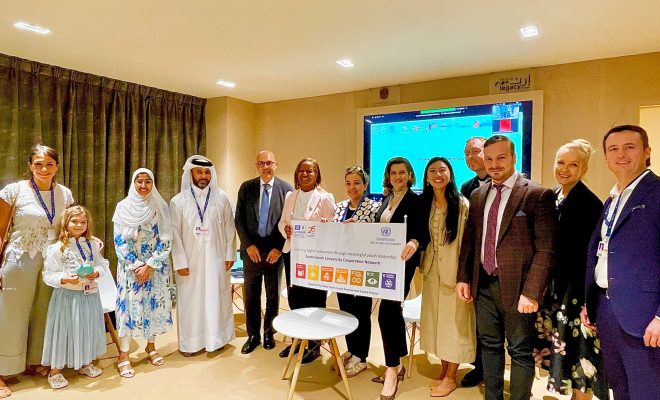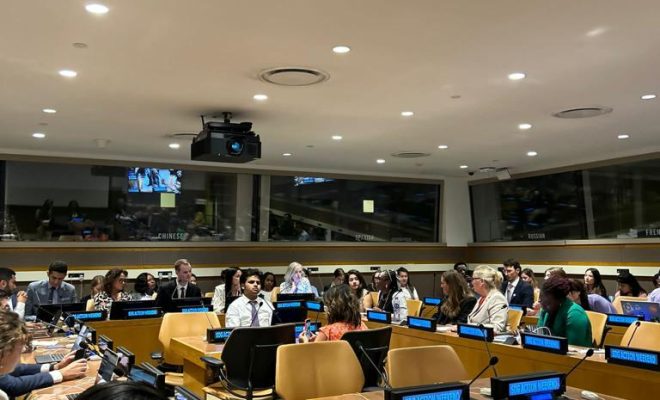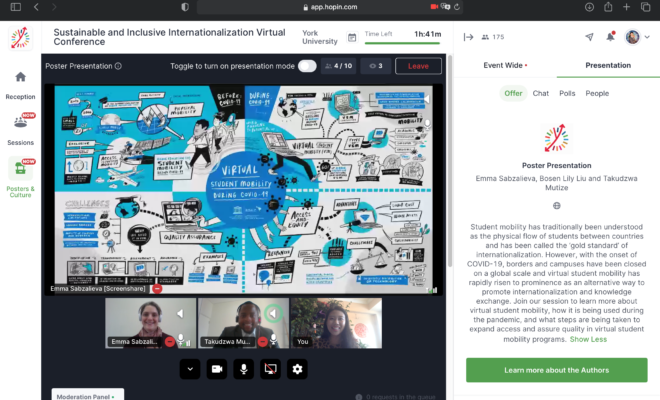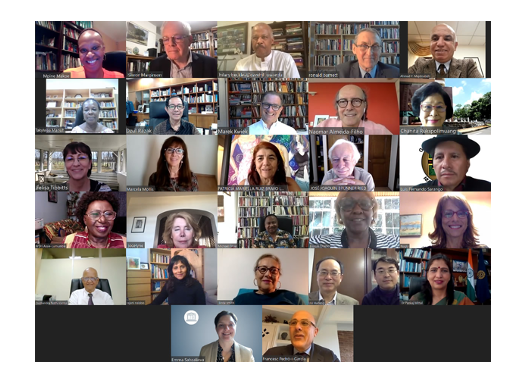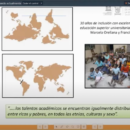Gathering global expertise on the futures of higher education

From left to right professors Mpine Makoe, Simon Marginson, Hilary Beckles, Ronald Barnett, Ahmad Y. Majdoubeh, Takyiwaa Manuh, Dzulkifli (Dzu) Razak, Marek Kwiek, Naomar Almeida-Filho, Chanita Rukspollmuang, Felisa Tibbitts, Marcela Mollis, Patricia Mariella Ruiz Bravo López, José Joaquín Brunner, N´Dri Thérèse Assié-Lumumba, Jocelyne Gacel-Ávila, Michael Cross, Dorcas Beryl Otieno, Nagla Rizk, Oomandra Nath Varma, Rajani Naidoo, Linda Tuhiwai Smith, Liu Haifeng, Emma Sabzalieva and Francesc Pedró
By Emma Sabzalieva | As part of IESALC’s Futures of Higher Education project, we worked with 25 higher education experts based around the world and with expertise in all UNESCO regions. By higher education experts, we mean people with extensive experience in teaching, researching and/or enacting higher education.
Close attention was paid to ensuring equitable gender and regional representation as well as to including experts whose expertise in higher education incorporates knowledge traditions beyond formal learning structures.
During February and March 2021, experts produced a short concept note summarizing their ideas in response to two open questions: How would you like higher education to be in 2050? How could higher education contribute to better futures for all in 2050?
The concept notes have been published on the IESALC website in English, French and Spanish. Experts also participated in an online small group workshop that created space to engage in dialogue, share knowledge, and extend the ideas presented in the concept notes. Four workshops took place in English and one was held in Spanish.
The expert consultations offered rich diversity and multiple perspectives on how to think about the futures of higher education. Conversations in the workshops brought these many issues to life, covering a wide range of topics. To name just a few, experts considered the longer term impact of Covid-19, the implications of ever-expanding access to higher education, the possibilities for personalized learning, how technologies will shape futures, and the role that higher education will play in tackling the climate crisis.
Many tensions and paradoxes came to light through the expert consultations, raising ongoing issues for our futures. While this project focusses on the thirty years ahead (and beyond 2050), this can only be imagined in the intersecting contexts of the past and the present, the local and the global.
Higher education is found to be central to human society, but as it stands, we know that knowledge has not set most of the world’s population free.
In sum, now more than ever is the time to think beyond the short-term of where higher education is now, beyond its disciplines and institutions, and to seriously and in long-term ways reimagine what could be ahead.
Based on the expert consultations, IESALC is producing a synthesis report that will be shared with the International Commission steering UNESCO’s flagship Futures of Education initiative and published on our website in April 2021.
IESALC extends its sincere gratitude to the experts for their willingness to participate in this phase of the project, and for the wisdoms and visions they so readily shared.
Listed alphabetically by last name, the experts are:
1. Professor Naomar Almeida-Filho, Institute of Advanced Studies at the University of São Paulo, Brazil
2. Professor N’Dri Thérèse Assié-Lumumba, Director of the Institute for African Development, Cornell University, USA
3. Professor Ronald Barnett, Emeritus Professor of Higher Education, University College London,UK
4. Professor Sir Hilary Beckles, Vice-Chancellor, University of the West Indies
5. Professor José Joaquín Brunner, Universidad Diego Portales, Chile
6. Professor Michael Cross, Director of the Ali Mazrui Centre for Higher Education Studies, University of Johannesburg, South Africa
7. Professor Jocelyne Gacel-Ávila, Coordinator of the LAC Regional Observatory on Internationalization and Networks in Tertiary Education, University of Guadalajara, México
8. Professor Marek Kwiek, UNESCO Chair in Institutional Research and Higher Education Policy and Director of the Institute for Advanced Studies in Social Sciences and Humanities, University of Poznan, Poland
9. Professor Liu Haifeng, College of Education, Zhejiang University, China
10. Professor Ahmad Y. Majdoubeh, Vice President for Humanities, University of Jordan, Jordan
11. Professor Mpine Makoe, The Commonwealth of Learning Chair OER, The Institute for Open Distance Learning, The University of South Africa, South Africa
12. Professor Emerita Takyiwaa Manuh, Institute of African Studies, University of Ghana, Ghana
13. Professor Simon Marginson, University of Oxford, UK
14. Dr. Pankaj Mittal, Secretary General, Association of Indian Universities, India
15. Professor Marcela Mollis, Research Director on Comparative Higher Education, Instituto Universitario de la Cooperación, Argentina
16. Professor Rajani Naidoo, Director of the International Centre of Higher Education Management and UNESCO Chair in Higher Education Management, University of Bath, UK
17. Dr. Oomandra Nath Varma, Director, Mauritius Institute of Education, Mauritius
18. Dr. Dorcas Beryl Otieno, OGW, UNESCO Chair on Higher Education for a Green Economy and Sustainability, Senior Lecturer, Department of Environmental Studies and Community Development, Kenyatta University, Kenya
19. Professor Dzulkifli (Dzul) Razak, Rector, International Islamic University Malaysia
20. Professor Nagla Rizk, The American University in Cairo, Egypt
21. Professor Patricia Mariella Ruiz Bravo Lopez, UNESCO Chair in Gender Equality in Higher Education, Pontifical Catholic University of Peru, Perú
22. Professor Emeritus Chanita Rukspollmuang, Vice President, Siam University, Thailand
23. Luis Fernando Sarango, Pushak/Rector, Pluriversidad Amawtay Wasi, Ecuador
24. Professor Linda Tuhiwai Smith, University of Waikato, New Zealand
25. Professor Felisa Tibbitts, UNESCO Chair in Human Rights and Higher Education, Chair in Human Rights Education, Utrecht University, Netherlands
RELATED ITEMS


